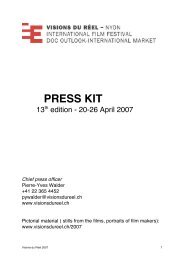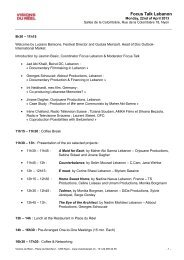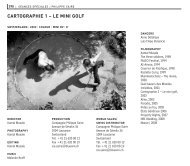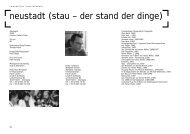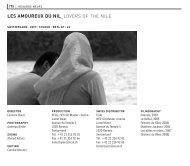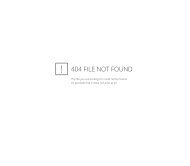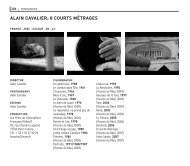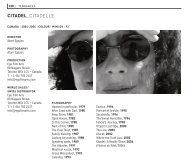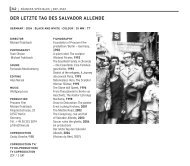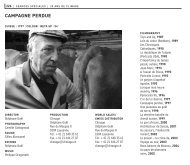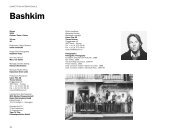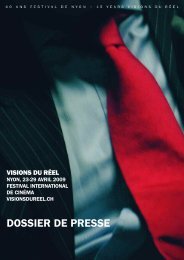Katalog 2013.pdf - Visions du Réel
Katalog 2013.pdf - Visions du Réel
Katalog 2013.pdf - Visions du Réel
Create successful ePaper yourself
Turn your PDF publications into a flip-book with our unique Google optimized e-Paper software.
250 focus liban<br />
Ghassan Salhab<br />
(Posthume)<br />
Lebanon | 2007 | 28’ | DV | Arabic<br />
Screenplay<br />
Ghassan Salhab<br />
Cinematography<br />
Louis Sarmad<br />
Sound<br />
Rana Eid<br />
Editing<br />
Simon El Habre<br />
Music<br />
Peteris Vasks, Wu Tang Clan,<br />
Six Organs of Admittance<br />
Pro<strong>du</strong>ction<br />
Ghassan Salhab (Mirrors)<br />
Filmography<br />
2011 La Montagne<br />
2009 1958<br />
2007 (Posthume) (sf)<br />
2006 Le dernier homme<br />
2006 Temps mort (sf)<br />
2005 Brêve rencontre avec Jean<br />
Luc Godard, ou le cinéma<br />
comme métaphore (mlf)<br />
2004 Narcisse per<strong>du</strong> (sf)<br />
2003 Mon corps vivant, mon<br />
corps mort (sf)<br />
2002 Terra incognita<br />
2000 La rose de personne (sf)<br />
2000 Baalbeck (sf)<br />
1999 De la sé<strong>du</strong>ction (mlf)<br />
1998 Beyrouth fantôme<br />
1994 Afrique fantôme (sf)<br />
1991 Après la mort (sf)<br />
1991 L’autre (sf)<br />
1986 La clef (sf)<br />
Après le néant, un visage apparaît à<br />
l’écran, regard à la caméra et donc au<br />
spectateur. Comme si le visage surgissait<br />
des décombres d’une ville d’après<br />
guerre, comme celle que l’on explore<br />
ici. Ces images se juxtaposent à celles<br />
issues des actualités télévisuelles, brouillant<br />
ainsi les frontières entre le réel et<br />
la fiction, entre ce que l’on voit et ce<br />
que l’on nous donne à voir. Peu après<br />
l’agression israélienne de 2006, Ghassan<br />
Salhab réalise cet essai filmique, qui<br />
porte indéniablement la signature unique<br />
de son auteur, où l’image est à la fois<br />
témoin absent et présent d’une guerre<br />
inatten<strong>du</strong>e. Véritable élégie contemporaine,<br />
(Posthume) rappelle la différence<br />
existant entre ce qui se passe à<br />
l’intérieur de nous-même et à l’extérieur.<br />
Salhab offre une réflexion cinématographique<br />
sur le Liban et un pari sur l’impossibilité<br />
de raconter la violence d’un pays<br />
meurtri dont les fantômes resurgissent<br />
des ruines et se fixent sur l’écran, avant<br />
de disparaître en fon<strong>du</strong> enchaîné.<br />
Nach dem Nichts erscheint ein Gesicht<br />
auf dem Bildschirm, der Blick ist der<br />
Kamera und somit dem Publikum zugewandt.<br />
Als würde das Gesicht aus den<br />
Ruinen einer Nachkriegsstadt wie jener,<br />
der wir hier erkunden, aufsteigen. Bilder,<br />
die neben anderen, aus den Nachrichten<br />
im Fernsehen stammenden Bildern<br />
erscheinen und die Grenzen zwischen<br />
Wirklichkeit und Fiktion, zwischen dem,<br />
was man sieht, und dem, was man uns<br />
zeigt, verwischen. Kurz nach dem israelischen<br />
Angriff 2006 dreht Ghassan<br />
Salhab diesen Essayfilm, der die unnachahmliche<br />
Handschrift seines Autors<br />
trägt und in dem das Bild die Rolle des<br />
zugleich abwesenden und anwesenden<br />
Zeugen eines unerwarteten Krieges<br />
spielt. (Posthume) erinnert in seiner<br />
Eigenschaft der modernen Elegie an den<br />
Unterschied zwischen dem, was sich in<br />
unserem Inneren und dem, was sich um<br />
uns herum abspielt. Salhab schafft eine<br />
filmische Reflexion über den Libanon<br />
und eine Wette über die Unmöglichkeit,<br />
die Gewalt eines geschundenen Landes<br />
zu erzählen, dessen Geister den Ruinen<br />
entsteigen und die Leinwand einnehmen,<br />
bevor sie in einer Überblen<strong>du</strong>ng<br />
verschwinden.<br />
After the void, a face appears on the<br />
screen, looking at the camera and<br />
thus at the audience. It is as if the face<br />
sprang out of the rubble of a post-war<br />
city, like the city we are exploring here.<br />
These images are juxtaposed with those<br />
from television news, thus blurring the<br />
boundaries between reality and fiction,<br />
between what we see and what we<br />
are allowed to see. Not long after the<br />
Israeli attack of 2006, Ghassan Salhab<br />
directed this film essay which unquestionably<br />
bears the unique stamp of its<br />
author; its images are both absent and<br />
present witnesses to an unexpected<br />
war. (Posthume) is a genuine contemporary<br />
elegy, reminding us of the differences<br />
between what happens within<br />
us and outside. Salhab offers up a cinematographic<br />
musing on Lebanon and a<br />
wager on the impossibility of recounting<br />
the violence of a bruised country, whose<br />
ghosts reappear from the ruins and stare<br />
at the screen, before disappearing in<br />
cross-fade.<br />
Contact<br />
Abbout Pro<strong>du</strong>ctions<br />
+961 1447823<br />
contact@abboutpro<strong>du</strong>ctions.com<br />
www.abboutpro<strong>du</strong>ctions.com<br />
Jasmin Basic



